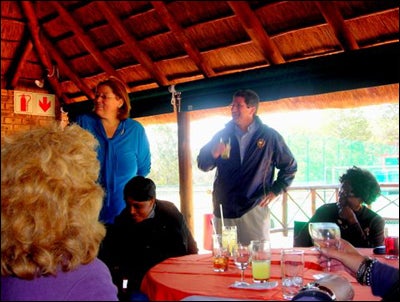Fulbright experience enriching, inspirational
By Kendra Alexander
East Carolina University education professor Dr. David Siegel, a Fulbright award winner who spent six weeks in South Africa, returned to campus with an increased appreciation for the value of student narratives in higher education.

David Siegel is pictured at the apartheid museum in Johannesburg, South Africa. (Contributed photos)
Educators must pay attention to individual students, he said. They should learn and draw inspiration from students’ “individual stories of struggle and challenge and resilience.”
At the University of South Africa in Johannesburg, Siegel said he was “inspired by the example of so many educators forging one-on-one connections with students, helping them to succeed against enormously tough odds.
“I’m increasingly concerned that we don’t have time for or interest in the life stories or life circumstances of individual students; much of our conversation in higher education is about averages and aggregates, but these manage to drown the single student in a sea of data,” he said.
Siegel encountered extreme poverty and diversity from rich to poor in South Africa. He said a person could walk from a nice building on campus just a couple blocks down the street and be surrounded by people forced to live in small spaces without water or power. Many young adults in South Africa overcome tremendous obstacles to obtain an education.
One student’s story was especially powerful.
A fellow teacher shared the story of “a student who lives in a shack with 10 people and uses an old abandoned car for his office; he lights candles and places them on the dashboard and writes papers in the freezing cold,” Siegel said.
“The student approached the teacher one day with a crumpled, shredded, stinking mass of paper and said that he couldn’t turn in his writing assignment even though he had completed it; rats had used the paper as a nest overnight.”
Siegel asked why the student persevered in getting an education despite so many obstacles. The teacher explained that the students stick with it for their families and communities, in hopes for a better life for all.
“These are students who surely know something about putting collective interests above their own comfort, even though they might not put it in quite those terms,” Siegel said.
Siegel traveled between August and September, lecturing on personal responsibility for leadership and change in students’ personal lives, their community and in the world. He told the students to “be the change you seek, don’t wait for hierarchical leaders to change things for you.”
Siegel also presented workshops on balancing competing interests in higher education, capacity for collaboration, corporatization of the academic enterprise, diversity and inclusion, the role of the academic leader, and the social purpose of the university.
He said that the kind and generous nature of the students and staff at the university was amazing. Students were completely engaged and interested in what he had to say, Siegel said.
Siegel called the experience one of the most enriching he has had throughout his life and professional career.
The Fulbright Scholar award that funded Siegel’s trip sends faculty and professionals abroad to share their knowledge. Recipients are selected based on academic or professional achievement. The Fulbright Program, America’s flagship international educational exchange activity, is sponsored by the U.S. Department of State, Bureau of Educational and Cultural Affairs.
###
For additional information, contact Kendra Alexander, Director of Development and Communications, at alexanderk@ecu.edu or 252-737-4162.



